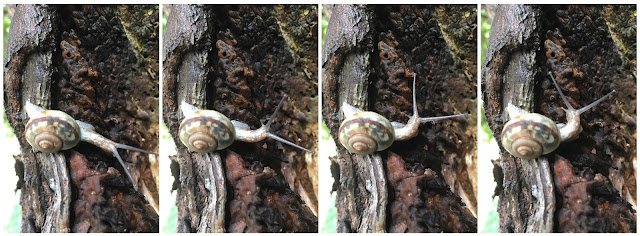 |
| A snail enjoying the start of the rainy season which began in Tokyo on Wednesday |
Apart from umbrella manufacturers, the only creatures happy with the coming of the rainy season are probably snails, pictured above, which are out on force at this time of year. The name for snail in Japanese, katatsumuri (カタツムリ), is usually written in katakana but does have kanji (蝸牛, sometimes pronounced kagyū), the second character of which is cow/bull (ushi), reflecting the fact that snails, like bulls, have "horns" (tsuno =角). Children though have different names for snails based on their movement and actions, namely maimai and denden-mushi, the latter featuring in a well-known children's song:
でんでん虫々 (mushi-mushi)カタツムリ
お前(mae)の頭(atama)はどこにある (Where is your head?)
角だせ槍(やり)だせ 頭だせ (Stick out your horns, stick out your spear/s, stick out your head!)
The second verse is the same except atama (head) is replaced with medama (eyes). Actually, snails are not the only animals with special onomatopoeic names - dogs, cats, pigs, and a few other animals are commonly referred to by children (and adults talking to children) using the sound those animals are perceived to make. This is rather different to English in which animal names are made cuter for children (doggie, kitty cat, piggly wiggly) but rarely changed altogether to mirror the sound. For example, while it would be perfectly normal to say "wan-wan da" when pointing to dog in Japan, it would be very strange to say, "Look at that woof-woof over there" in English! The table below lists some common animal sounds in Japanese and compares them with their English equivalents, illustrating just how culturally specific such sounds are:
